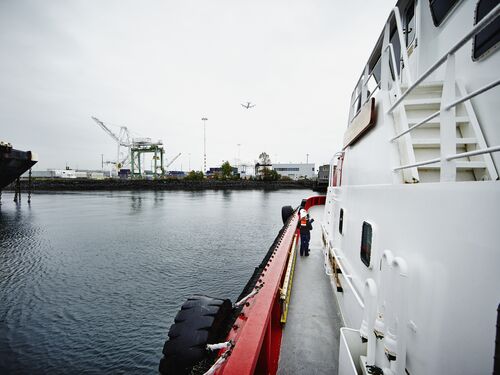Gulf Research Program Announces $25 Million in Funding to Improve Forecasts of Ocean Dynamics in the Gulf of Mexico
News Release
Last update March 18, 2021
WASHINGTON — The Gulf Research Program (GRP) of the National Academies of Sciences, Engineering, and Medicine announced a $25 million funding opportunity for researchers interested in improving operational forecasts of ocean dynamics in the Gulf of Mexico for reduction of risk in offshore energy exploration and production. Applicants must submit a letter of intent by 5 p.m. EDT Tuesday, March 30, 2021.
This funding opportunity, which is part of the GRP’s Understanding Gulf Ocean Systems (UGOS) initiative, will support up to three multi-investigator consortia, composed of partners from diverse institutions, disciplines, and sectors. Funding awards will support projects up to 60 months, beginning early 2022.
Presently, there are limitations in existing forecasting capabilities and prediction data and tools, as well as gaps in understanding Gulf of Mexico ocean dynamics and its interaction with the Loop Current. This has implications for the Gulf’s livelihood, wildlife, and health. Improving forecasts of the Gulf’s ocean dynamics could promote safer offshore operations, protect coastal communities and ecological resources, and facilitate disaster response, among other benefits. Specifically, accurate and reliable forecasts are essential for enabling safety of transportation, installation, and other offshore energy activities; improving the forecasting of hurricane intensification; and ensuring sustainable management of fisheries.
Enhancing the prediction capabilities of Gulf ocean dynamics could also help improve operational forecasts, their applications, and support decision-making for end-users.
Watch the GRP’s recent Virtual Q&A Session to learn more about this funding opportunity. The UGOS website has additional details about the UGOS initiative, current activities, and ongoing projects.
The National Academies’ Gulf Research Program is an independent, science-based program founded in 2013 as part of legal settlements with the companies involved in the 2010 Deepwater Horizon disaster. It seeks to enhance offshore energy system safety and protect human health and the environment by catalyzing advances in science, practice, and capacity to generate long-term benefits for the Gulf of Mexico region and the nation. The program has $500 million for use over 30 years to fund grants, fellowships, and other activities in the areas of research and development, education and training, and monitoring and synthesis. Visit nationalacademies.org/gulf/gulf-research-program to learn more.
The National Academies of Sciences, Engineering, and Medicine are private, nonprofit institutions that provide independent, objective analysis and advice to the nation to solve complex problems and inform public policy decisions related to science, technology, and medicine. The Academies operate under an 1863 congressional charter to the National Academy of Sciences, signed by President Lincoln.
More like this
Discover
Events
Right Now & Next Up
Stay in the loop with can’t-miss sessions, live events, and activities happening over the next two days.
NAS Building Guided Tours Available!
Participate in a one-hour guided tour of the historic National Academy of Sciences building, highlighting its distinctive architecture, renowned artwork, and the intersection of art, science, and culture.

